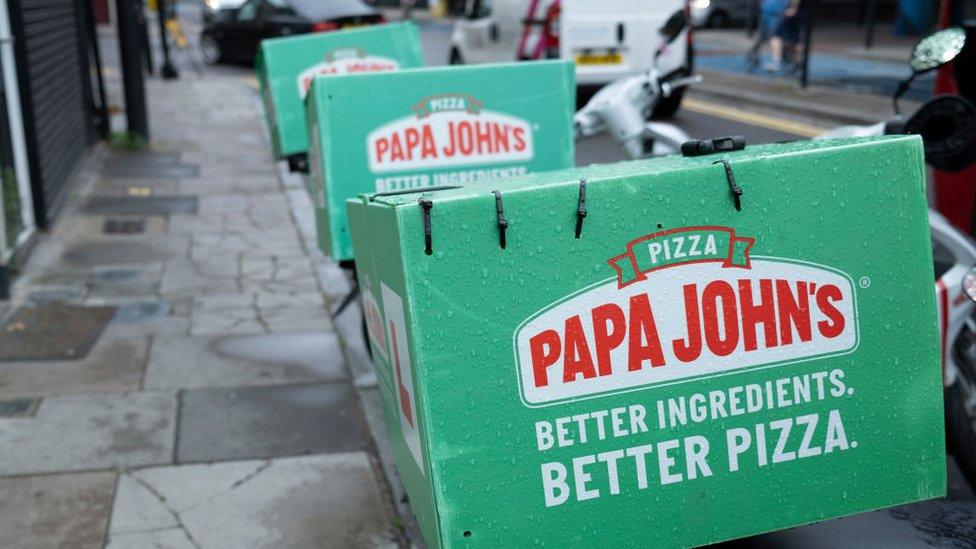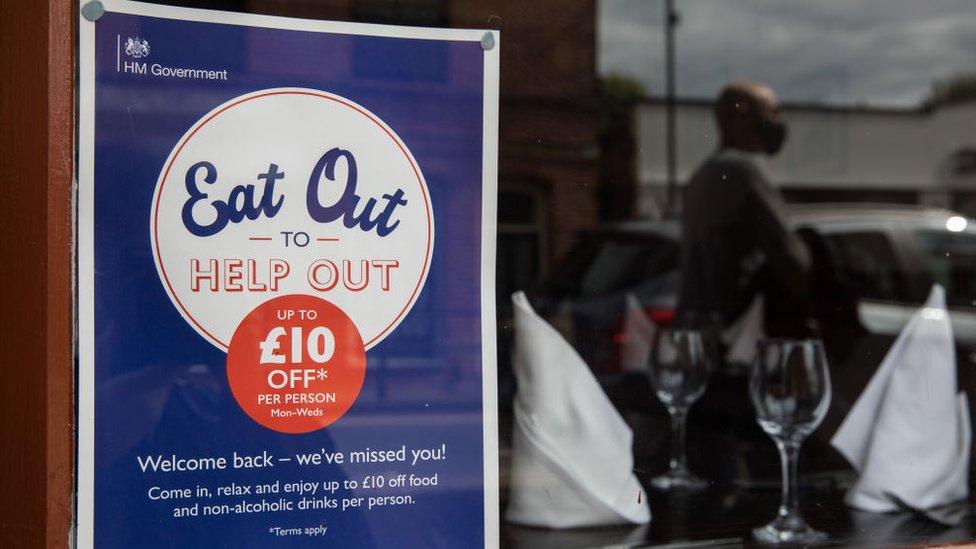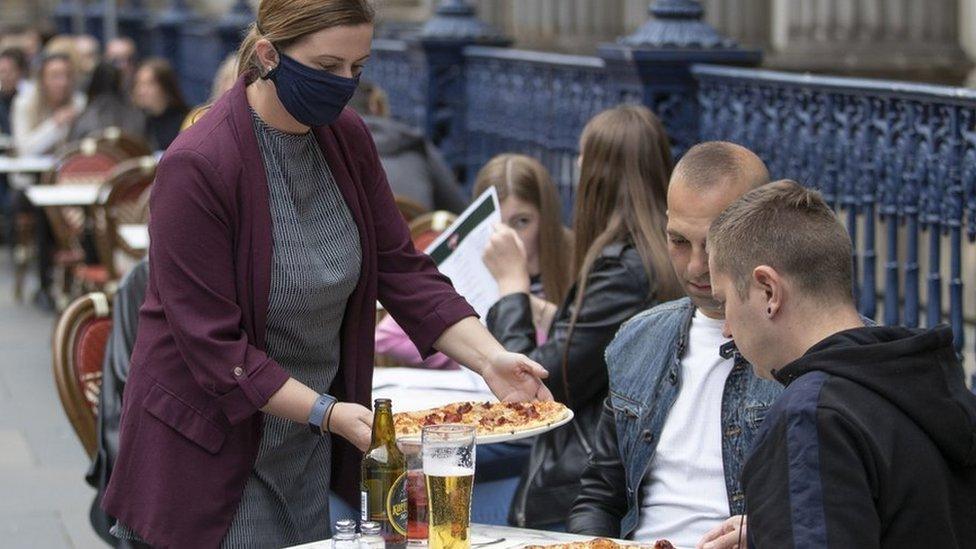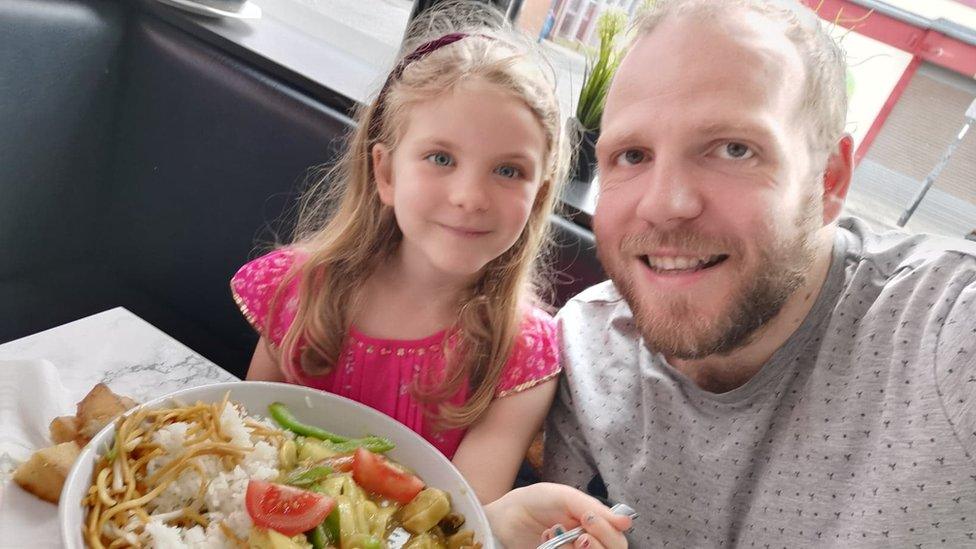Papa John's investigating claims of £250,000 Eat Out to Help Out fraud
- Published

UK takeaway pizza chain Papa John's is investigating allegations that taxpayer cash was fraudulently claimed during the Eat Out to Help Out scheme.
A Papa John's franchisee Raheel Choudhary claimed over £250,000 in non-existent meals during the scheme, the Daily Mail alleges, external.
Mr Choudhary has denied all the allegations.
He told the BBC: "We are confident that we were fully compliant with the criteria set by the government."
Papa John's GB Ltd said it was investigating the allegations "thoroughly".
"We will be extremely concerned and disappointed if they prove to be true. All of Papa John's UK stores are run by franchisees and we made it very clear to all franchisees that we felt it unlikely that they would be eligible to participate in Eat Out To Help Out (EOTHO)," a spokesman told the BBC.
"It is important that our investigation is completed fully before drawing any conclusions, but if any franchisee participated improperly in EOTHO, they will have been in breach of their franchise agreement with us, and we will require them to make things right."
The Mail said it conducted its investigation with the help of several whistleblowers who worked for Mr Choudhary's stores.
Allegations
The newspaper claims that Mr Choudhary instructed staff to process thousands of fake meals under the scheme across 57 of the 61 branches he owns, resulting in hundreds of thousands of pounds being wrongly claimed.
In one incident, the Mail alleges that 13 orders were processed in under a minute at the Tunbridge Wells branch, despite staff being told it was forbidden to eat in the store, which has no tables.
It is alleged that branch managers were given targets of £500-£600 per day for stores that had turnovers of under £10,000 per week, or a target of £1,000 a day for bigger branches with a turnover of more than £10,000 per week.
The newspaper added that Mr Choudhary had instructed his staff to record payments made by "phantom covers" as voucher payments.
A representative for Mr Choudhary disputed the value of the claims made under the Eat Out to Help Out scheme, stating it was £185,015 and not the alleged £250,000.
Mr Choudhary said in a statement: "Of my 61 franchises, 40 have seating capacity, and we implemented the 'Eat Out to Help Out Scheme' in all of those 40 stores from Monday to Wednesday throughout August.

Over 100 million meals were claimed by diners in August during the Eat Out to Help Out scheme
"All customers who benefited from the scheme ate in store and we are confident that we were fully compliant with the criteria set by the government.
A representative for Mr Choudhary said the Eat Out to Help Out scheme accounted for 9% of total orders in August.
Mr Choudhary said: "When the government's scheme ended, we followed up with our own discount offer in September."
Mr Choudhary said that on average, his stores saw an average of 32 customers a day across the 40 stores that took part in the scheme in August.
However, the BBC understands that franchisees were clearly instructed by Papa John's GB Ltd that the franchise would not be participating in the scheme.
Franchisees are bound by agreements that require them to follow all guidelines issued by Papa John's GB Ltd, as well as abiding by and meeting ethical standards and regulatory obligations.
It is also understood that the digital tills software, which is frequently remotely updated by the head office, has never included an Eat Out to Help Out scheme voucher button, and the scheme cannot be used on the Papa John's UK website either.
A HMRC spokesperson said: "It's our duty to protect taxpayers' money and we will not hesitate to act against those who attempt to break the rules.
"We have built checks into the Eat Out to Help Out scheme to prevent fraud and protect public money, and will check claims and take appropriate action to withhold or recover payments found to be dishonest or inaccurate.
"Anyone concerned that an establishment is abusing the scheme can report fraud to HMRC."
- Published4 September 2020

- Published26 August 2020
